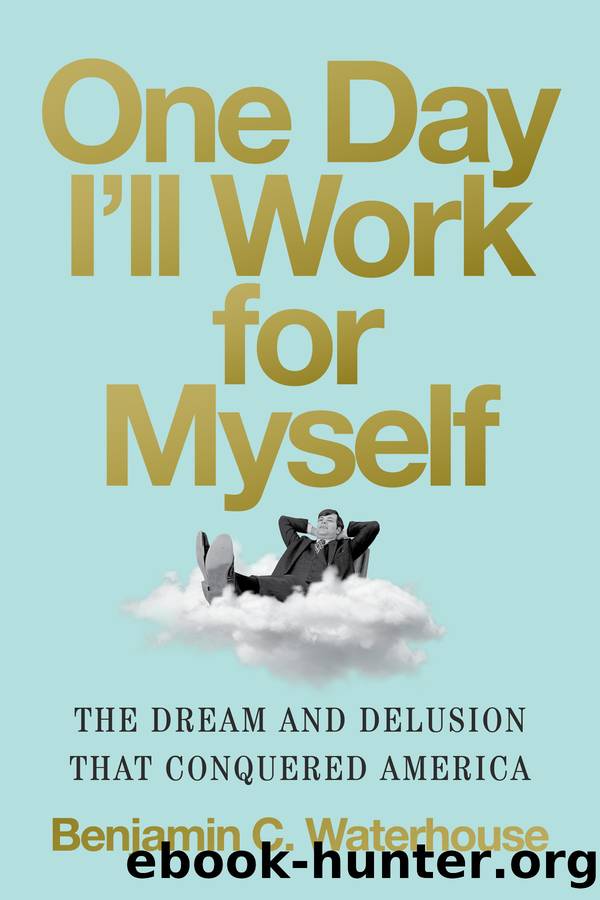One Day I'll Work for Myself by Benjamin C. Waterhouse

Author:Benjamin C. Waterhouse
Language: eng
Format: epub
Publisher: W. W. Norton & Company
Published: 2023-11-26T00:00:00+00:00
* * *
* Please note: I was unable to independently confirm the figures cited by Mr. Koach comparing the relative cost of SEC form filing and four-year tuition at MIT.
7
BE YOUR OWN BOSS
One day in 1989, my father came home from selling industrial machine equipment all day and announced that he had quit his job. At forty-five years old, he was sick of commuting to work in a jacket and tie every day, only to work for someone else and draw the same paycheck week after week. He was a good salesman, he figured, and he knew the local market for small-scale industrial machinery. So from that day forward, he would answer only to himself. He would be self-employed.
I donât recommend my dadâs approach as a model of marital responsibility. My mom was somewhat put out to learn, without warning, that she would now be the familyâs sole breadwinner for the indefinite future. Nonetheless, my familyâs story is a poignant example of how pervasive the ideals of self-employment and independent business ownership had become by the end of the 1980s. The virtues of individualism, of breaking with the established order, and of taking advantage of an opportunity to develop something new all had become thoroughly baked into American culture. The siren call of starting your own business seemed to sing louder than ever.
The national press breathlessly perpetuated that message. Throughout the 1980s, reporters paid particular attention to the apparent trend of high-ranking corporate executives walking away from the rat race. A fifty-nine-year-old financial executive named Robert Ritchie, for example, seemed to embody an idyllic, if somewhat stereotypic, dream. Facing the imminent threat of being laid off, Ritchie decided to redefine his circumstances on his own termsâby taking an âearly retirementâ and buying a country inn in Vermont. There, he reported, he finally found his bliss. He was âearning less money, working longer hours, and enjoying it more.â1
Combining corporate skills with a lifelong passionâthat became a running motif as be-your-own-boss stories proliferated.
In 1985, after seven years as a consultant for Boston Consulting Group (BCG), thirty-six-year-old Jim Koch decided to change things up. âBeing a consultant makes you cocky,â he told a reporter from the Wall Street Journal. âYou think you can do anything.â In Kochâs case, âanythingâ meant starting the Boston Beer Company, whose signature Samuel Adams beer is often credited with launching the craft brewing movement in the United States. While Kochâs success was unusual (and delicious), his determination to go it alone wasnât. His former bosses at BCG estimated that some 30 percent of people who left the consulting firm in the mid-1980s went on to start their own companies.2
These folk tales played critical cultural roles. First, they linked the old reverence for small business ownership with the new excitement around entrepreneurship. After all, both Ritchieâs Vermont inn and Kochâs brewery were prototypical small business ventures, even if the latter became an internationally recognized brand. And second, they gave the impression that successful, liberating self-employment was widely achievable. If
Download
This site does not store any files on its server. We only index and link to content provided by other sites. Please contact the content providers to delete copyright contents if any and email us, we'll remove relevant links or contents immediately.
The ChatGPT Millionaire: Making Money Online has never been this EASY by Neil Dagger(757)
Dan Lok by unknow(684)
Side Hustles for Dummies by Simon Alan R.;(655)
Improving Internet Access to Help Small Business Compete in a Global Economy by Hermann E. Walker(553)
From Science to Business: Preparing Female Scientists and Engineers for Successful Transitions into Entrepreneurship: Summary of a Workshop by Catherine Jay Didion(532)
Start. Scale. Exit. Repeat. by Colin C. Campbell(521)
How to Grow Your Small Business by Donald Miller(513)
500 Ways to Make Money by NAVEEN CHAUHAN(466)
Tiny Business, Big Money by Elaine Pofeldt(463)
Do Bigger Things: A Practical Guide to Powerful Innovation in a Changing World by Wilde Jennifer & McClure Dan(462)
Founder vs Investor by Elizabeth Joy Zalman(449)
The Startup Owner's Manual by Steve Blank(423)
Studies on hydrolysisalcoholysisammonolysis mechanisms of ethylene terephthalate dimer using DFT method by unknow(411)
Think Your Way to Success: How to Develop a Winning Mindset and Achieve Amazing Results by Mark Rhodes(410)
SURVIVAL SKILLS FOR FREELANCERS by Townsend Sarah(392)
The Worth of Water by Gary White & Matt Damon(391)
The Five Most Important Questions You Will Ever Ask About Your Organization by Peter F. Drucker & NULL(389)
The Harder I Fall, the Higher I Bounce: Life Lessons From the Entrepreneur Dubbed the King of Kiosks by Fortune Magazine by Max James(387)
Read Books All Day and Get Paid For It: The Business of Book Coaching by Jennie Nash(387)
